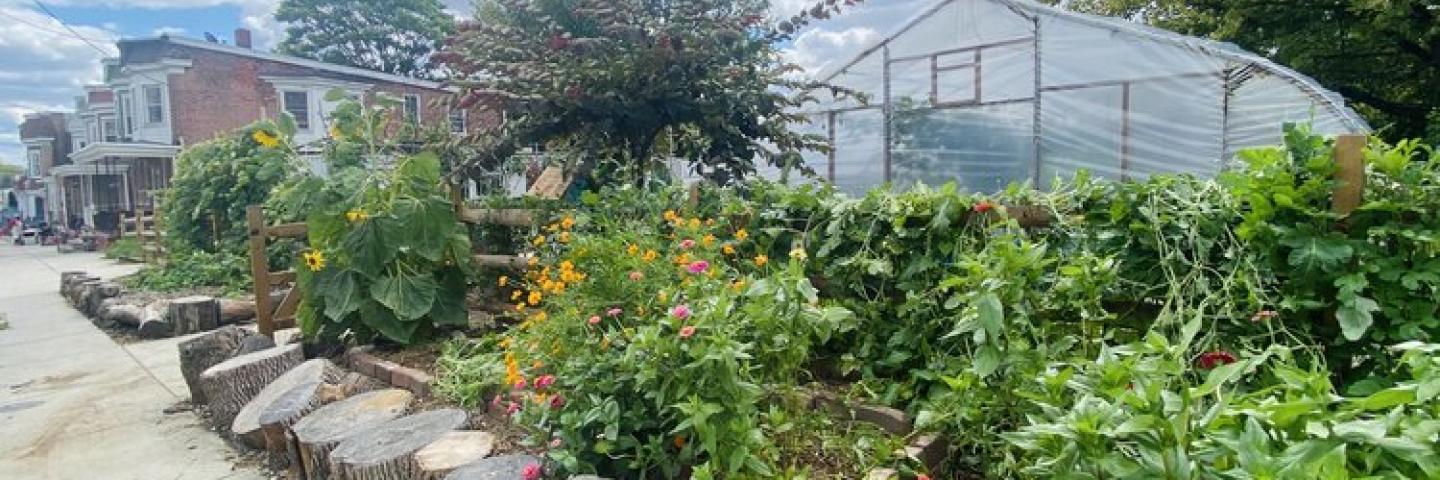Growing Food, Relationships and Future Leaders

Delaware urban farmer is committed to making impact in community.
In the center of East 23 rd street in Wilmington, lots that were abandoned for years have been replaced with flourishing urban gardens. Once filled with trash, debris, and deteriorating housing structures, now the lots have been transformed to grow dozens of types of vegetables, fruits, flowers and herbs.
A significant feat but one that required much patience, time, resources, and prayer said Matthew Williams, founder and Executive Director of Conscious Connections, Inc. which operates the urban farm.
In 2021 the farm has produced amaranth, kale, raspberries, apples, tomatoes, squash, cucumbers, watermelons, peppers, various ethnic vegetables, herbs and more.
“I’m not only growing fruits and vegetables here but I’m also growing relationships in our community,” said Williams. “It is such a blessing.” In addition to providing fresh produce to neighbors, local Brandywine Village residents and a new Community supported agriculture (CSA) program, he also runs a Leadership in Training program (L.I.T. Crew), which engages minority high-school students in all aspects of farming. He also helps students explore their creative side by bringing attention to real-world issues facing youth in the community through the production of a comic book series. The comic book heroes are also on display at the farm and Williams has plans to have a mural painted this spring that will further showcase his characters and mission.
The excitement is palpable when Williams talks about the garden’s future. “We recently began a beehive, which has produced 10 gallons of honey in the first season,” said Williams.
“We also had an arborist bring us approximately a dozen potted trees to help our students understand the benefit of native trees.”
Williams recognizes that the farm’s success is not his own. He worked with a wide range of local, state and federal entities over the last decade, including the New Castle Conservation District and the USDA Natural Resources Conservation Service (NRCS) in Delaware.
NRCS has worked with Williams for almost a decade. First through a national pilot to increase community access to fresh foods and then by offering technical assistance for his farm’s soil, water, and other natural resource concerns. In 2016, Williams installed his first high tunnel with financial assistance from NRCS.
More recently in 2020, NRCS provided financial assistance for a composting facility to efficiently manage and recycle vegetable and organic waste to nourish the soil.
His future plans include two additional high tunnels. “The high tunnel is extremely beneficial to the work that we do,” said Williams. “We grow our hot peppers in the high tunnel. Our hot peppers are attached to our hot sauce and our hot sauce is one of the things that we’re going to use to generate some income so that we can continue to offer programs.”
NRCS in Delaware has been building toward a more prescriptive approach in its conservation efforts with urban farmers. “By drawing upon the knowledge of what works for farmers like Matthew allows us to assess our programs and strategies for how we are supporting producers and ensuring it is truly going to meet their needs,” said Delaware State Conservationist Kasey Taylor.
To date, Delaware adopted a cover crop scenario for 1 acre or less at a higher payment rate and a scenario for roof gutter with a storage tank, which allows rainwater to be collected and held in the tank until needed. At the national level, NRCS is looking to further expand on conservation activities to assist urban farmers.
Delaware farmers are encouraged to call their local USDA Service Center and ask to speak with a conservation planner about options to address natural resource concerns on their agricultural operations.
When asked what advice he would give to other urban farmers, he said, “Just do it. If you have a dream or a vision, don’t give up on it.” “But also make sure you reach out to your local NRCS office; they have been extremely instrumental in helping us get to where we are today.”
In Delaware’s Sussex County, call 302-856-3990, ext. 3; in Kent County, call 302-741-2600, ext. 3; and in New Castle County, call 302-832-3100, ext. 3. Or visit www.de.nrcs.usda.gov for more information.

